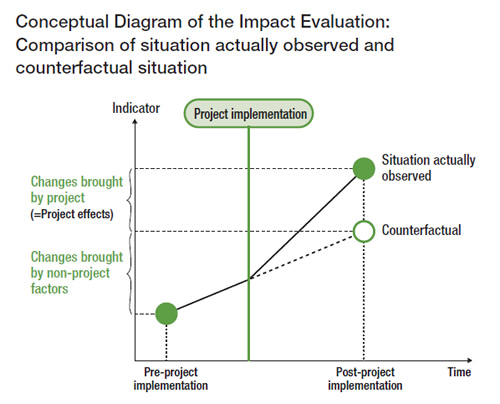To further enhance project effectiveness and quality, JICA has been promoting evidence-based project implementation and emphasizing the application of impact evaluation as a major tool for this purpose. Using statistical and econometric methods, impact evaluation assesses the changes in target society achieved by specific measures, projects, or development models to improve and solve development issues. JICA has introduced this evaluation method, in addition to those traditionally used to measure effects, for some projects to assess their effects more rigorously. These evaluation results can then be used as reliable evidence by JICA for project management and by partner countries for policy-making.

Evaluation Department
- Small Scale Irrigation Management Project (Indonesia) (PDF/1.15MB)
- Pasak Irrigation Project (Thailand) (PDF/906KB)
- Impact Evaluation of Third Elementary Education Project in the Republic of the Philippines (PDF/1.31MB)
- Impact Evaluation of the Bohol Irrigation Project (Phase 2) in the Republic of the Philippines (PDF/2.87MB)
- Impact Evaluation Report on the ARMM Social Fund for Peace and Development Project (the Philippines) (PDF/1.28MB)
- Impact Evaluation of Rural Road Improvement Project in Morocco (PDF/1.11MB)
- Evaluation of the Peacebuilding Impact: Water Supply Improvement in the Host Communities of Syrian Refugees in Jordan (PDF/1.43MB)
-
Monitoring the Smallholder Horticulture Empowerment Promotion (SHEP) Project in Malawi using SWIFT (PDF/1.4MB)
JICA Ogata Sadako Research Institute for Peace and Development (JICA Ogata Research Institute)
- Impact of a shade coffee certification program on forest conservation: A case study from a wild coffee forest in Ethiopia (PDF/447KB)
- Impact of Community Management on Forest Protection: Evidence from an Aid-Funded Project in Ethiopia (PDF/582KB)
- Impact of Farmer Field Schools on Agricultural Income and Skills: Evidence from an Aid-Funded Project in Rural Ethiopia (PDF/582KB)
- Do Community-Managed Schools Facilitate Social CapitalAccumulation? Evidence from the COGES Project in Burkina-Faso (PDF/484KB)
- Election, Implementation, and Social Capital in School-Based Management: Evidence from a Randomized Field Experiment on the COGES Project in Burkina Faso (PDF/878.4KB)
- Can School-Based Management Generate Community-Wide Impacts in Less Developed Countries? Evidence from Randomized Experiments in Burkina Faso (PDF/530.2KB)
- How Can Community Participation Improve Educational Outcomes? Experimental Evidence from a School-Based Management Project in Burkina Faso (PDF/575.8KB)
- The Impact of Training on Technology Adoption and Productivity of Rice Farming in Tanzania: Is Farmer-to-Farmer Extension Effective? (PDF/516.6KB)
- Enhancing Rice Production in Uganda: Impact Evaluation of a Training Program and Guidebook Distribution in Uganda (PDF/541.3KB)
- Does a Rural Road Improvement Project Contribute to Inclusive Growth? - A Case Study from Bangladesh (PDF/516KB)
- Can Efficient Provision of Business Development Services Bring Better Results for SMEs?: Evidence from a Networking Project in Thailand (PDF/688KB)
- Individualized Self-learning Program to Improve Primary Education: Evidence from a Randomized Field Experiment in Bangladesh (PDF/1.68MB)
- Were the Adverse Effects of Disability on Employment Mitigated during 2002-2015 in South Africa?: A Pseudo-Panel Approach (PDF/653KB)
- Impacts of Kaizen Management on Workers: Evidence from Central America and the Caribbean Region (PDF/658KB)
- Heterogeneous Effects of Urban Public Transportation on Employment by Gender: Evidence from the Delhi Metro (PDF/6.16MB)
- Enlightening Communities and Parents for Improving Student Learning Evidence from Randomized Experiment in Niger(PDF/531KB)
- Developing Textbooks to Improve Student Math Learning: Empirical Evidence from El Salvador (PDF/1.30MB)
- EMBRACE intervention to improve the continuum of care in maternal and newborn health in Ghana: The RE-AIM framework-based evaluation (external link)
- Evaluation of a package of continuum of care interventions for improved maternal, newborn, and child health outcomes and service coverage in Ghana: A cluster-randomized trial (external link)
- Strengthening Teacher Support for Students to Improve Math Learning: Empirical Evidence on a Structured Pedagogy Program in El Salvador (PDF/2.39MB)
Human Development Department
- Strengthening the community support group to improve maternal and neonatal health seeking behaviors: A cluster-randomized controlled trial in Satkhira District, Bangladesh (external link)
- An impact evaluation of the Safe Motherhood Promotion Project in Bangladesh: Evidence from Japanese aid-funded technical cooperation (external link)
- Is the Maternal and Child Health (MCH) handbook effective in improving health-related behavior? (external link)
- Project for Enhancing Access and Capacity of EQUITV Program (EQUITV Phase 2) (Papua New Guinea) (PDF/301KB)
- Evaluating the impact of continuous quality improvement methods at hospitals in Tanzania: a cluster-randomized trial (PDF/241KB)
- The "5S" approach to improve a working environment can reduce waiting time: findings from hospitals in Northern Tanzania (external link)
- Effectiveness of a Mobile Short-Message-Service Based Disease Outbreak Alert System in Kenya (external link)
- Cost-effectiveness of SMS appointment reminders in increasing vaccination uptake in Lagos, Nigeria: A multi-centered randomized controlled trial (external link)
- Effectiveness of the maternal and child health handbook for improving continuum of care and other maternal and child health indicators: A cluster randomized controlled trial in Angola (external link)
Economic Development Department
Financial Cooperation Implementation Department
Private Sector Partnership and Finance Department
Governance and Peace Building Department
Indonesia Office
- Behavioral impact of disaster education:Evidence from a dance-based program in Indonesia
- - Journal (external site)
- - Working Paper (external link)




scroll